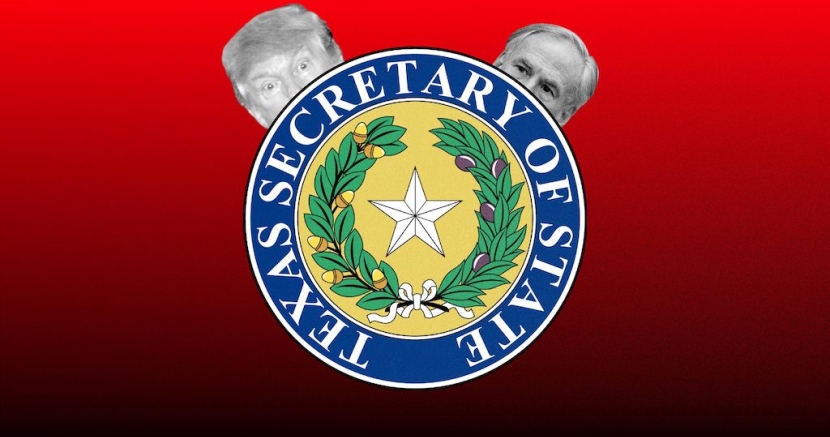Toplines & Key Points:
-
Gov. Abbott appointed John Scott mere days after the final special session. Since a secretary of state can only be confirmed by the Texas Senate when in session, Scott won’t need senate approval until lawmakers return to the Capitol in 2023.
-
Scott was one of the attorneys who represented Trump in a lawsuit to overturn the Pennsylvania election results Big Lie
-
Scott is just another tool in Abbott’s belt, willing to upend whatever sense of security we have in our elections for no reason other than to appease baseless claims by the far-right.
-
Given Scott’s history with cases that suppress voting rights and his past with Abbott, we should be concerned about any future threats to our right to vote.
We have seen Abbott undermine the security of our safe elections repeatedly in 2021.
From passing restrictive voting laws that disproportionately affect people of color and those with disabilities to calling for elections audits because of baseless claims made by far-right republican politicians, he has been relentless.
With the 2022 governor’s race approaching, Abbott needs to make some final moves, which is why, on October 21st, Abbott nominated Fort Worth attorney, John Scott, as the new Texas Secretary of State.
Here are five things you need to know about Texas’ new acting Secretary of State:
1. Scott briefly represented Donald J. Trump in his initial attempts to overturn the 2020 election.
In November 2020, Scott was among several attorneys representing Trump in a lawsuit to overturn the Pennsylvania election results. While he pulled out of the lawsuit after less than a week, his withdrawal only occured because of a ruling by the federal appeals court that essentially ended the case.
Scott’s involvement in the Trump case is a key reason as to why he was considered for the secretary of state position. Trump has been calling for election audits in Texas for months and since the legislature did not pass any bill regarding audits and Abbott refuses to listen to Lt. Gov. Dan Patrick’s call for fourth special session, Abbott figured his next best bet in appeasing far-right cohorts was appointing a secretary of state that has already been involved in Trump’s desperate search for non-existent fraud.
2. Abbott timed Scott’s appointment perfectly.
The timing of Scott’s appointment is no coincidence. Abbott’s announcement came mere days after the close of the third special legislative session. Since a secretary of state can only be confirmed by the Texas Senate when in session, Scott won’t need senate approval until lawmakers return to the Capitol in 2023. In the meantime, he’ll remain Texas’ acting Secretary of State which means Scott will be in charge of next year’s statewide races when Abbott will be running for reelection.
3. Scott has a history with Abbott
He has been an attorney for over 30 years, but some of that time has been spent working with Abbott to increase voter suppression. Scott served under Abbott as deputy attorney general when Abbott was still attorney general and, while in the position, defended Texas' voter ID law in a federal court trial. Unsurprisingly, the court ruled that the law was discriminatory.
Scott is just another tool in Abbott’s belt, willing to upend whatever sense of security we have in our elections for no reason other than to appease baseless claims by the far-right.
4. We should be wary of any secretary of state appointed by Abbott.
Abbott’s last two appointments were never confirmed by the Texas Senate. Former Secretary of State Ruth Ruggero Hughs had a history of putting corporate interests before those of the people. She was forced to resign in May because the legislative session ended without her ever being confirmed, a requirement under the Texas Constitution.
Prior to Hughs, Democratic senators blocked the confirmation of predecessor David Whitley. Whitley, under Abbott’s guidance, was responsible for a massive voter suppression effort that targeted naturalized Texas citizens.
5. Scott will have all of the power without any of the approval
We saw Abbott’s approval ratings fall as the 2021 legislative sessions progressed but that didn’t stop him from signing racist, anti-trans, and anti-abortion bills into law. In addition, while there has been no evidence of voter fraud, even after extensive review, Abbott listened to Trump’s request to add an election audit to the list of priorities at the end of the last legislative session.
It was only when the audit request failed to be approved by the Texas Legislature that Abbott decided to appoint Scott as acting secretary of state.
Since the secretary of state is the top election official in Texas, you would think confirmation would be required before they could execute their duties. Unfortunately, like his predecessors, Scott’s appointment means near immediate power with no need for approval by any of our representatives. Given his history with cases that suppress voting rights and his past with Abbott, we should be concerned about any future threats to our right to vote.
DONATE
Your donation supports our media and helps us keep it free of ads and paywalls.









